
- English Conversation Lessons
- English Essay Topics
- English Autobiography Examples
- Report Writing
- Letter Writing
- Expansion of Ideas(English Proverbs)
- English Grammar
- English Debate Topics
- English Stories
- English Speech Topics
- English Poems
- Riddles with Answers
- English Idioms
- Simple English Conversations
- Greetings & Wishes
- Thank you Messages
- Premium Plans
- Student’s Log In
- 1 item ₹150.00

Travel Conversation Dialogues in English
Traveling exposes one to new sights, emotions, and experiences. Outings teach you a lot of things and modify your view on life. If you are fluent in English, you can go anywhere in the world and make many new acquaintances. Learn travel conversation dialogues as well as travel terminology to spice up your language ability and enjoy travelling to any region of the world.
If you find yourself stuck in the middle of nowhere, you will undoubtedly receive prompt assistance. Because your ability to communicate will aid you in locating and arriving at your desired location. So plan your route ahead of time and travel with confidence by learning travel conversation dialogues in English. Do not be scared of the obstacles; instead, continue to study and improve your English communication abilities , as they will come in handy in your life to manage any challenging scenario.
Travel Conversation Lessons Topics
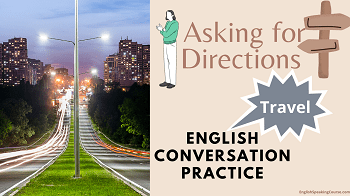
- Asking for Directions
It is extremely normal to get lost when travelling and then hunt for the right place. Wonderful travel talk between a tourist and a few bystanders guiding how to go to a place. Traveling is enjoyable, but it can be quite irritating when you are travelling overseas and are unable to obtain accurate directions.
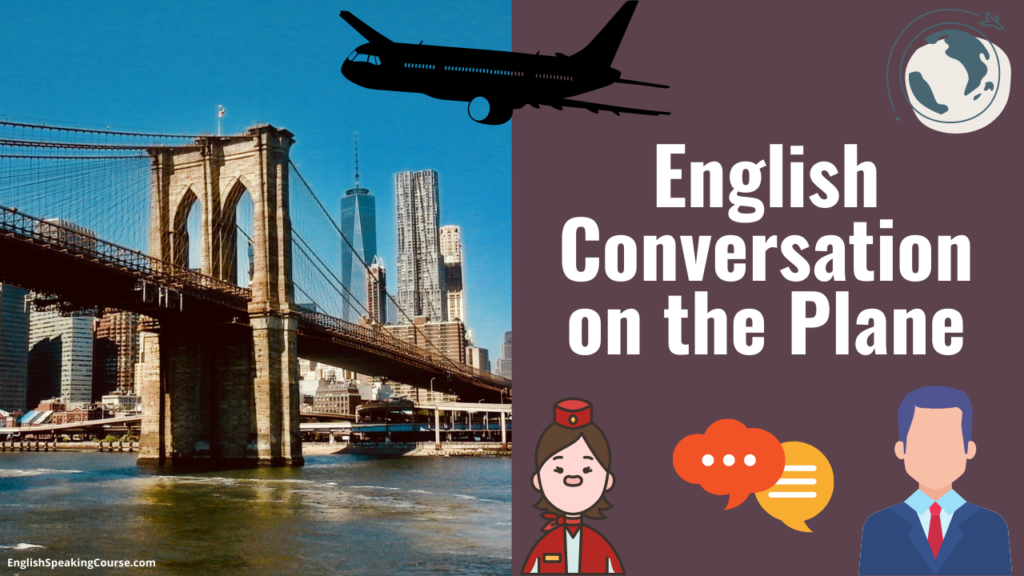
- Conversation on the Plane
Travelling and socializing are inextricably linked. Even while we’re on board, we talk to a lot of strangers, such as the flight crew or the flight attendant. However, it is critical to communicate with such folks nicely and respectfully. In conclusion, you will learn new dialogues concentrating on travel conversations to help you improve your language abilities.
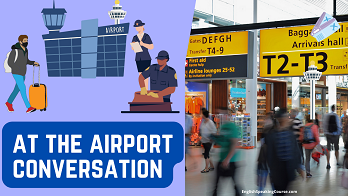
Conversation at the Airport
When checking in at the airport, this is a very frequent travel dialogue. Moreover, it is when you follow the method specified by the officials there. Get through the full procedure and communicate with the employees without becoming frustrated. Most importantly, don’t pass up any opportunity to converse in English and take it to the next level.
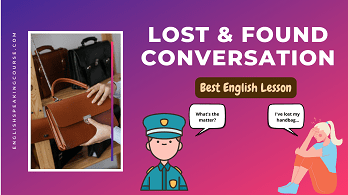
- Lost and Found Conversation
A simple yet odd conversation that everyone will, at some point in their lives, indulge in at least once. It is a conversation about lost and found items between a woman who has misplaced her handbag and a security guard whom she contacts in order to register her complaint.

Museum Vocabulary & Dialogues
This is a wonderful opportunity to improve one’s English language skills by studying museum vocabulary and dialogue. Using these vocabulary words and dialogues as a guide, you may improve your ability to communicate in English and practise having conversational exchanges. When you go to the museum the next time with your family or friends, make sure to take advantage of the opportunity to have some engaging dialogues.
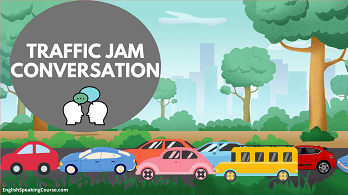
Conversation about Traffic Jam
In this Basic English speaking lesson, a father and a son are having a conversation about traffic jams. This problem is one that practically all of us face on a daily basis in our lives. Therefore, make the most of the opportunity to master the language associated with traffic and the accompanying conversations so that you may use it anytime you find yourself in a similar scenario.
Buy this Bundle Plan
Start Talking Perfect English Right Now!

Full English Speaking Course – All Lessons – One Time Plan
Course Content for Students & Teachers:
100+ Video and Audio based English Speaking Course Conversations
12000+ Text & Audio based Frequently used Vocabulary & Dialogues with correct pronunciations
Full Grammar & 15000+ Solved Composition topics on Essay Writing, Autobiography, Report Writing, Debate Writing, Story Writing, Speech Writing, Letter Writing, Expansion of Ideas(Proverbs), Expansion of Idioms, Riddles with Answers, Poem Writing and many more topics
Plus Access to the Daily Added Content
Leave a Reply Cancel reply
You must be logged in to post a comment.

English Courses
- Mom & Son Breakfast Talk
- Dad & Son Breakfast Talk
- Going Out for Breakfast
- Healthy Breakfast Ideas
- Breakfast Table Conversation
- Talking about Household Chores
- Power Outage Conversation
- Speaking About Vegetables
- Talk About Television
- Telephone Conversation in English
- Renting an Apartment Vocabulary
- Talking about Pets
- Self Introduction Conversation
- Introduce Yourself in English
- Morning Walk Conversation
- Make New Friends Conversation
- English Speaking with Friends
- Conversation Between Siblings
- Talking about Smartphones
- Talking About City Life
- English Conversation on the Bus
- Talking about Dust Allergy
- Talking about Food Allergies
- Brushing Teeth Conversation
- Replacing Worn out Toothbrush
- Brushing Teeth with Braces
- Switching to Herbal Toothpaste
- Benefits of using Tongue Cleaner
- Talking about Illness
- Talking about Fitness and Health
- Talking About Fitness for Kids
- Visiting a Doctor Conversation
- Speaking about Lifestyle
- Conversation about Air Pollution
- Using an ATM Conversation
- Opening a Bank Account
- Car Accident Conversation
- Talking about Accident
- Exam Conversation with Kids
- At the Library Conversation
- Talking about Studies
- Offline vs Online School
- Internet Vocabulary and Dialogues
- Advantages of Homeschooling
- Inviting for Birthday Party
- Phone Conversation
- At the Airport Conversation
- Museum Vocabulary
- Conversation about Traffic
- Order Food Over the Phone
- At the Restaurant Conversation
- Talking about Music
- English Music Vocabulary
- Talk on Music Band
- Shopping for Clothes
- Buying a Smartphone
- Ordering Flowers Conversation
- English Conversation in Vegetable Market
- At the Supermarket
- At the Pharmacy
- Friends Talking about Chess
- Importance of Outdoor Activities
- Talking About Football
- Weekend Plans Conversation
- At the Beach Conversation
- New Job Conversation
- Business English Conversation
- Expressing Boredom in English
- English Conversation at the Salon
- English Speaking at the Bakery
- Talking About Studies
- Siblings Studying Together
- Speaking about Outdoor Activities
- Talk About Photography
- Essay on My School
- Essay on Summer Vacation
- Essay on Time Management
- Essay on Hard Work
- Essay on Health is Wealth
- Essay on Time is Money
- Republic Day Essay
- Essay on My Hobby
- Essay on Myself
- Essay on My Teacher
- Essay on My Best Friend
- Essay on My Family
- Essay on My Mother
- Essay on My Father
- Essay on Friendship
- Essay on Global Warming
- Essay on Child Labor
- Essay on Mahatma Gandhi
- Essay on Holi
- Essay on Pollution
- Essay on Education
- Essay on Air Pollution
- Essay on Communication
- Essay on Doctor
- Essay on Environment
- Essay on Gender Inequality
- Essay on Happiness
- Essay on Healthy Food
- Essay on My Favorite Festival Diwali
- Essay on My Favorite Sport
- Essay on My Parents
- Essay on Overpopulation
- Essay on Poverty
- Essay on Travelling
- Essay on Unemployment
- Essay on Unity in Diversity
- Essay on Water Pollution
- Essay on Water
- Essay on Women Empowerment
- Essay on Yoga
- Essay on Christmas
- Autobiography of a Book
- Autobiography of a Brook
- Autobiography of a Camera
- Autobiography of a Cat
- Autobiography of a Classroom
- Autobiography of a Coin
- Autobiography of a Dog
- Autobiography of a Doll
- Autobiography of a Farmer
- Autobiography of a Flower
- Autobiography of a Football
- Autobiography of a Haunted House
- Autobiography of a House
- Autobiography of a Kite
- Autobiography of a Library
- Autobiography of a Mobile Phone
- Autobiography of a Mosquito
- Autobiography of a Newspaper
- Autobiography of a Pen
- Autobiography of a Pencil
- Autobiography of a River
- Autobiography of a Table
- Autobiography of a Tiger
- Autobiography of a Tree
- Autobiography of an Umbrella
- Autobiography of Bicycle
- Autobiography of Bird
- Autobiography of Chair
- Autobiography of Clock
- Autobiography of Computer
- Autobiography of Earth
- Autobiography of Lion
- Autobiography of Peacock
- Autobiography of Rain
- Autobiography of a Soldier
- Autobiography of Sun
- Autobiography of Water Bottle
- Autobiography of Water Droplet
- Adopting a Village
- Teaching Children in an Adopted Village
- Programs Organized in an Adopted Village
- Volunteering in an Adopted Village
- Activities in an Adopted Village
- School Annual Day Celebration
- Republic Day Celebration
- Teachers Day Celebration
- World Environment Day Celebration
- Children’s Day Celebration
- Visiting the Wild Animal Rehabilitation Centre
- The Animal Sanctuary Visit
- Animal Shelter Visit
- Animal Rescue Center Visit
- Adult Literacy Camp
- Burglary of Jewelry
- India Wins Test Match
- School Children Affected by Food Poisoning
- Heavy Rains in Mumbai
- School Children Injured in Bus Accident
- Complaint Letter to the Chairman of Housing Society
- Request Letter to the Municipal Corporation
- Complaint Letter to the State Electricity Board
- Suggestion Letter to the Chief Minister
- Request Letter to the District Collector
- Request Letter to the Commissioner of Police
- Application Letter for an Internship
- Application Letter for a Job
- Request Letter for a Character Certificate
- Request Letter for a Better Lab and Library
- Global Warming Debate
- Animal Rights Debate
- Climate Change Debate
- Gun Control Debate
- Role of Religion in Society Debate
- Republic Day Speech
- Poems about Life
- Poems about Nature
- Poems for Boys
- Poems for Girls
- Poems for Mothers
- Poems for Friends
- Poems for Kids
- Poems about Trees
- Poems about Peace
- Funny Poems
- Poems About Climate Change
- Poems about Dreams
- Poems about Education
- Poems about Environment
- Poems about Eyes
- Poems about Family
- Poems about Fear
- Poems about Feminism
- Poems about Flowers
- Poems about Freedom
- Poems about Friendship
- Poems about Happiness
- Poems about History
- Poems about Hope
- Poems about India
- Poems about Joy
- Poems about Loneliness
- Poems about Love
- Poems about Night
- Poems about Power
- Poems about Water
- Poems about Women Empowerment
- Poems about Women’s Rights
- Poems on Earth
- Poems on Home
- Poems on Honesty
- Poems on Humanity
- Poems on Jungle
- Poems on Kindness
- Poems on Mental Health
- Poems on Moon
- Poems on Music
- Poems on Patriotism
- A Bad Workman Always Blames His Tools
- A Bird in the Hand is Worth Two in the Bush
- A Fool and His Money Are Soon Parted
- A Penny Saved is a Penny Earned
- A Picture is Worth a Thousand Words
- A Stitch in Time Saves Nine
- A Watched Pot Never Boils
- Absence Make the Heart Grow Fonder
- Actions Speak Louder than Words
- All Good Things Come to Those Who Wait
- All Good Things Must Come To an End
- All Is Fair in Love and War
- All That Glitters is Not Gold
- All’s Well That Ends Well
- An Apple a Day Keeps the Doctor Away
- An Empty Vessel Makes Much Noise
- An Idle Mind is Devil’s Workshop
- As You Sow, So Shall You Reap
- Barking Dogs Seldom Bite
- Beauty is in the Eye of the Beholder
- Beggars can’t be Choosers
- Better Late than Never
- Better the Devil You Know than the Devil You Don’t
- Birds of a Feather Flock Together
- Blood is Thicker than Water
- Boys will be Boys
- Charity Begins at Home
- Cleanliness is Next to Godliness
- Curiosity Killed the Cat
- Don’t Bite Off More than You Chew
- Don’t Bite the Hand that Feeds You
- Don’t Blow Your Own Trumpet
- Don’t Count your Chickens Before They Hatch
- Don’t Cry Over Spilled Milk
- Don’t Judge a Book by its Cover
- Don’t Put All Your Eggs in One Basket
- Don’t Put the Cart Before the Horse
- Don’t Throw The Baby Out With the Bathwater
- Early to Bed and Early to Rise Makes a Man Healthy, Wealthy, and Wise
- Easy Come, Easy Go
- Every Cloud Has a Silver Lining
- Every Dog Has His Day
- Fools Rush in Where Angels Fear to Tread
- Fortune Favors the Bold
- Give a Man a Fish, and You Feed Him for a Day; Teach a Man to Fish, and You Feed Him for a Lifetime
- Give Credit Where Credit is Due
- God Helps Those Who Help Themselves
- Half a Loaf is Better Than None
- Haste Makes Waste
- Health is Wealth
- Honesty is the Best Policy
- If at First You Don’t Succeed, Try, Try Again
- If It ain’t Broke, Don’t Fix It
- If the Shoe Fits, Wear It
- If you can’t Beat them, Join them
- If you Want Something Done Right, Do It Yourself
- Ignorance is Bliss
- It ain’t Over Till the Fat Lady Sings
- It Takes Two to Tango
- It’s a Small World
- It’s Always Darkest Before the Dawn
- It’s Better to Ask Forgiveness than Permission
- Its Better to Be Safe than Sorry
- It’s Better to Give than to Receive
- It’s Never Too Late to Mend
- It’s not What you Know, it’s Who you Know
- Jack of All Trades, Master of None
- Keep Your Friends Close and Your Enemies Closer
- Keep Your Mouth Shut and Your Eyes Open
- Kill Two Birds with One Stone
- Knowledge is Power
- Laughter is the Best Medicine
- Leave No Stone Unturned
- Let Sleeping Dogs Lie
- Life is a Journey, Not a Destination
- Life is Like a Box of Chocolates; You Never Know What You’re Gonna Get
- Like Father, Like Son
- Look Before You Leap
- Love Conquers All
- Make Hay While The Sun Shines
- Money Can’t Buy Happiness
- Money Doesn’t Grow on Trees
- Money Talks
- Necessity is the Mother of Invention
- No Man is an Island
- No Pain, No Gain
- Nothing Ventured, Nothing Gained
- One Man’s Trash is Another Man’s Treasure
- Out of Sight, Out of Mind
- Patience is a Virtue
- Practice Makes Perfect
- Prevention is Better than Cure
- Rome Wasn’t Built in A Day
- Slow and Steady Wins the Race
- The Early Bird Catches the Worm
- The Grass is Always Greener on the Other Side
- The Pen is Mightier Than the Sword
- The Proof of the Pudding is in the Eating
- There is No Place Like Home
- There’s No Time Like the Present
- Time Heals All Wounds
- Time is Money
- Too Many Cooks Spoil the Broth
- Two Heads are Better than One
- When in Rome, do as the Romans do
- Where There’s Smoke, There’s Fire
- You Can Lead a Horse to Water, But You Can’t Make it Drink
- You Can’t Have Your Cake and Eat It Too
- You Can’t Make an Omelet Without Breaking Eggs
- You Scratch My Back, And I’ll Scratch Yours
- You’re Never Too Old to Learn
- You’re Only As Strong As Your Weakest Link
- Parts of Speech
- Lola’s Dream
- Snowy Learns to Brave the Rain
- The Ant Explorer
- The Blind Archer
- The Brave Ant
- The Disguised King
- The Enchanted Blade
- The Enchanted Garden of Melodies
- The Endless Bag
- The Faithful Companion
- The Farmer’s Treasure
- The Frog and the Mischievous Fishes
- The Fruit Seller’s Fortune
- The Generous Monkey of the Forest
- The Gentle Giant
- A Blessing in Disguise
- A Dime a Dozen
- A Piece of Cake
- Apple of My Eye
- As Easy as Pie
- Back to the Drawing Board
- Beat Around the Bush
- Bite the Bullet
- Break a Leg
- Butterflies in My Stomach
- By the Skin of Your Teeth
- Caught Red-Handed
- Come Rain or Shine
- Cool as a Cucumber
- Cry over Spilled Milk
- Cut the Mustard
- Devil’s Advocate
- Down to the Wire
- Drink Like a Fish
- Eating Habits
- Supermarket
- Vegetable Market
- College Canteen
- Household Topics
- Diwali Festival
- Republic Day Wishes
- Birthday wishes for kids
- Birthday Wishes for Sister
- Birthday Wishes for Brother
- Birthday Wishes for Friend
- Birthday Wishes for Daughter
- Birthday Wishes for Son
- Women’s Day Wishes
- Thanks for Birthday Wishes
- Thank You Messages for Friends
- Thanks for Anniversary Wishes

Justin Morgan
Latest articles.
- Practical English Usage
- Overview of Babson University
- Babson University’s Entrepreneurship Program
- The Founding of Babson University
- Babson University’s Impact on the Global Economy
- Babson University’s Post-Pandemic Student Preparation
- Babson University’s Notable Alumni
- Babson University’s Business Research
- Campus Life at Babson University
- Babson University’s Leading Scholars and Experts
- Babson University’s Social Impact Program
- The Future of Babson University
- Top Programs at Cardiff University
- COVID-19 Research at Cardiff University
- Culture and Values of Cardiff University

50 fun travel conversation questions
Travel conversation questions.
Free discussion worksheets with pictures to describe the topic of travel. Difficult words on this first printable include – pack, prefer, cruise, destination, thoroughly, gotten, accommodation, backpacking, international, furthest, and distance.
The travel conversation questions on worksheet 1 are –
1 – When was the last time you traveled? Where did you go?
2 – What is your favorite thing about traveling?
3 – Where would you like to travel to next? When do you think you will go there?
4 – How long can you travel before you start to miss home?
5 – What are the most important things to pack before you go traveling?
6 – What kinds of transport do you prefer to travel by?
7 – Are there any places in your country that you never want to travel to? Why not?
8 – Who in your family is the best person to travel with?
9 – Have you ever been on a cruise ship? Would you like to take a cruise?
10 – What kinds of activities do you like to do when you are traveling?
11 – Have you ever learned or tried to speak another language while traveling?
12 – What are the top travel destinations in your country? Have you been to them?
13 – How do you usually decide on a travel destination?
14 – Do you like to plan your travel thoroughly or just make it up as you go along?
15 – What do you think of backpacking? Would you like to try it?
16 – Have you ever gotten lost on your travels? What did you do?
17 – What kind of accommodation do you usually stay in when you take trips?
18 – What is the best way to keep your money safe when you go traveling?
19 – Have you ever felt scared or been in danger on your travels?
20 – How has COVID-19 changed travel in your country and internationally?
21 – Where is it your dream to visit? Do you think you will ever get there?
22 – What is the furthest distance you have ever been from your home?
23 – Do you prefer to travel alone, with friends , or with family?
24 – What is the first thing you do when you arrive in a new city?
25 – Do you use any websites or apps when you travel? What for?
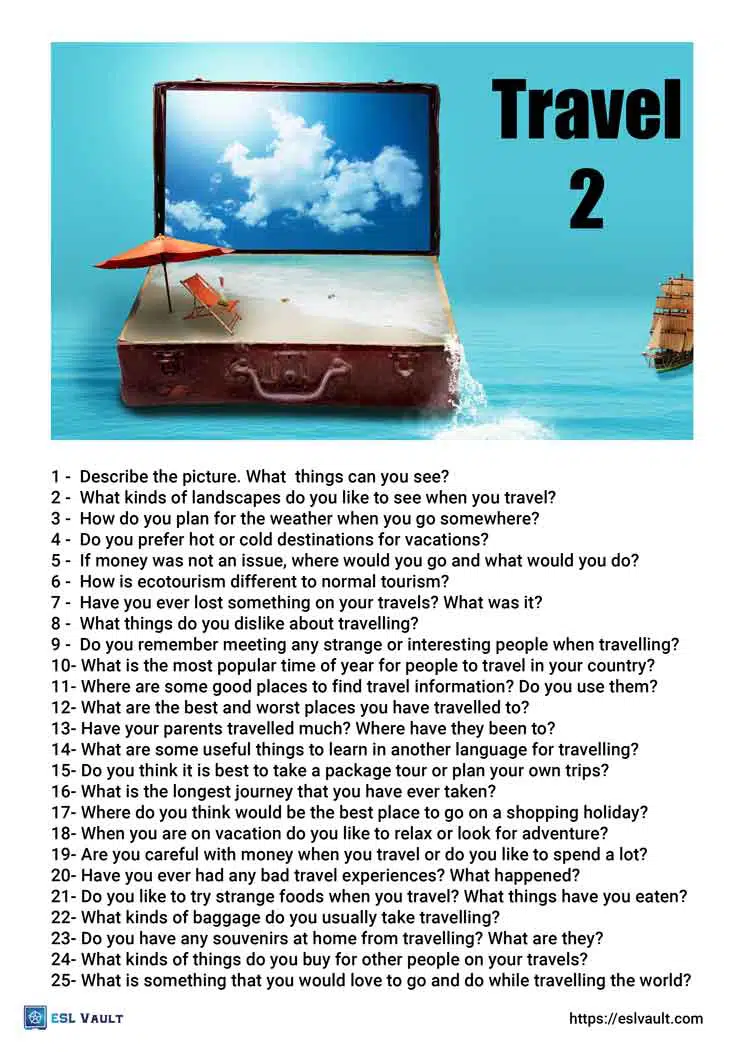
Travel conversation questions 2
Before starting the discussion with this second set of questions, be sure the students are familiar with the terms – landscape, ecotourism, issue (problem), journey, baggage, and souvenir.
On this second worksheet, the travel conversation questions are –
26 – What kinds of landscapes do you like to see when you travel?
27 – How do you plan for the weather when you go somewhere?
28 – Do you prefer hot or cold destinations for vacations?
29 – If money was not an issue, where would you go and what would you do?
30 – How is ecotourism different to normal tourism?
31 – Have you ever lost something on your travels? What was it?
32 – What things do you dislike about traveling?
33 – Do you remember meeting any strange or interesting people when traveling?
34 – What is the most popular time of year for people to travel in your country?
35 – Where are some good places to find travel information? Do you use them?
36 – What are the best and worst places you have traveled to?
37 – Have your parents traveled much? Where have they been?
38 – What are some useful things to learn in another language for traveling?
39 – Do you think it is best to take a package tour or plan your own trips?
40 – What is the longest journey that you have ever taken?
41 – Where do you think would be the best place to go on a shopping holiday?
42 – When you are on vacation do you like to relax or look for adventure?
43 – Are you careful with money when you travel or do you like to spend a lot?
44 – Have you ever had any bad travel experiences? What happened?
45 – Do you like to try strange foods when you travel? What things have you eaten?
46 – What kinds of baggage do you usually take when traveling?
47 – Do you have any souvenirs at home from traveling? What are they?
48 – What kinds of things do you buy for other people on your travels?
49 – What is something that you would love to go and do while traveling the world ?
50 – What is the best photograph that you have taken while traveling? Where were you?
Related activities
For further discussion you may want to use the transport conversation questions or the airport conversation questions . There are also transport and airport activities in the vocabulary worksheets archives.
For talking about weather and cities around the world there is also the weather pair work speaking activity.
You might also like these
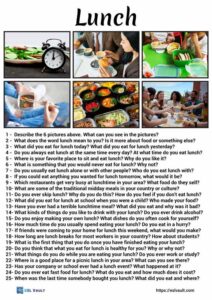
25 Tasty conversation questions about lunch

50 friendship conversation questions
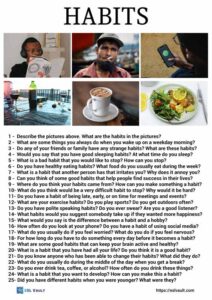
25 habits conversation questions
Free ESL and English teaching resources, no sign up required. Just find what you like, download it and head to class!
Privacy Policy
Share ESL Vault with your friends!
- Writing Worksheets
- Vocabulary Worksheets
- Pronunciation
- Kids worksheets
- Idioms and Expressions
- ESL Puzzles
- ESL Pair Work Activities
- ESL Conversation Questions
- Coloring Pages
- Articles, Lists and Ideas
- Art and Craft Activities

ESL Conversation – Vacation and Traveling

The online post provides ESL (English as a Second Language) conversation materials and lessons focused on the topic of vacations and traveling. The materials are designed to help learners practice and improve their English speaking skills while learning vocabulary and expressions related to traveling, such as booking flights, accommodations, and transportation. The post may include sample dialogues, vocabulary lists, grammar exercises, and other helpful resources to aid in the language learning process. By using these materials, ESL learners can develop their communication skills and gain confidence in using English to talk about planning and experiencing a trip, sharing travel experiences, and discussing different travel destinations and cultures.
Vacation and traveling ESL resources are free for everyone. We have collected the best ESL speaking practice handouts and contents for a variety of topics. The handouts and activities are online-friendly and flexible to meet all of your needs.

ESL Conversation – Dream Vacation
ESL speaking handout discussing dream vacations.
Time: 30 – 45 minutes
Level: Pre-intermediate/Intermediate

ESL Conversation – Going on a Trip
Speaking practice about going on a trip.
Time: 45 – 60 minutes

Travel Discussion Questions
This handout is provided by allthingsgrammar.com .
Travel discussion questions for pre-intermediate and intermediate students.
Time: 20 – 30 minutes

Travel Vocabulary Worksheet
Travel vocabulary gap fill worksheet for pre-intermediate and intermediate students.

ESL Conversation – Vacation and Traveling Questions
ESL discussion questions about vacations.

Travel Phrasal Verbs Worksheet
Travel phrasal verbs worksheet for pre-intermediate and intermediate students.
Post navigation
Previous post.
This website uses cookies to improve your experience. We'll assume you're ok with this, but you can opt-out if you wish. Read More
Real English Conversation

English Conversation: Airport Travel
Listen to this interesting English conversation about travelling though airports that don’t speak your native language. This article includes:
- Listen to a natural conversation and learn some vocabulary
- A conversation at the airport between an airline agent and a passenger who is checking in for his flight.
Listen to Part 1 of this English Conversation
SEND ME THIS Lesson!
Interesting Vocabulary from this Airport Conversation
newbie – Someone who is new and inexperienced at an activity or a job.
- We have a newbie working with us today. It should be interesting to see what mistakes they make.
- I feel like a complete newbie at this sport. I hope I learn quickly.
layover – The time in between flight connections.
- There is a very short layover in Calgary. Hopefully there will be no flight delays otherwise we are going to miss the connection.
- A 2 hour layover is perfect. You have enough time to go through customs and security plus grab a bite to eat if you’re hungry.
gut instinct – An gut feeling or gut instinct can be used equally. It is an instinct or intuition that helps you to decide what you should do in a certain situation.
- I have a gut feeling that I’m going to get offered the job.
- My gut instinct says we should turn left on this road.
Get the FULL Conversation Lesson for Airport Travel
✔ 15-Minute Audio Lesson full of interesting airport stories ✔ Read & Listen with the PDF text transcription ✔ Practice Exercises to test your listening comprehension ✔ Learn Vocabulary with examples and explanations
Conversations At The Airport You Might Have
English is the international language of travelling and airports. Employees who work with passengers are even required to speak a minimum level of English in certain airports.
Let’s look at a few of the English conversations you are likely to have when travelling internationally.
- Checking-in to your flight and getting your boarding pass
- Security check and baggage screening
- Asking about airport gates and terminal locations
- Ordering food at restaurants in the airport or purchasing small items
- Airport announcements and flight boarding calls
- Speaking with the flight attendants during the flight
And if your luggage goes missing…
- Describing the disappearance
- Providing address details so the airport can deliver it later
Or if you miss a flight connection…
- Finding alternative flight options
- Discussing hotel options if you have to stay overnight
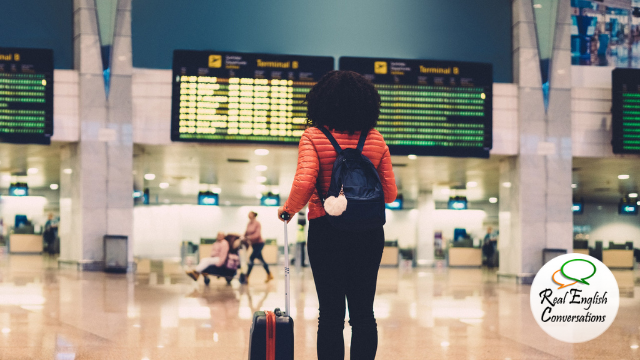
Airport Check-in Conversation Dialogue
In this article, we have created a dialogue for you to study and learn from that can help you while you are communicating in English with the airline agents.
Sample Dialogue:
The flight agent will probably start with a greeting such as hello, good evening, good morning or good afternoon.
Agent: Do you have your passport and boarding pass?
Passenger: Yes, here they are.
Agent: How many bags will you be checking in today?
Passenger: Just this one.
Agent: Okay great. Do you mind putting it on the scare here?
If you do not have any checked luggage, you might say “I don’t have any checked luggage. Just my carry-on bag here”. If your bag looks bigger than the allowed size, they might have to measure it.
Agent: Oh, it looks like your bag is overweight by 1 kilogram. Would you like to take something out to put in your carry-on bag so that we do not have to charge the overweight bag fee?
Passenger: Yes, please. One minute. Let me take out my sweater.
Unzips the suitcase and takes out the sweater. The puts it back on the scale.
Passenger: Okay, is that below weight?
Agent: Yes, the bag is fine now. Let me print off your bag tags.
Agent: Okay, here are your boarding passes and the luggage tracking numbers in case something happens to your luggage. Your flight is departing from Terminal A Gate 37. The flight leaves in 2 hours and the gates can change so I recommend checking the gate number one hour before the boarding time just in case it changes. That’s all for now. Have a good flight!
Passenger: I will, thanks. Have a nice day.
Learn from English Conversations like This!
This Real English Conversation lesson is one of the 41 conversation lessons we have available to members of our courses. Each conversation lesson includes a full PDF transcription, MP3 download , speaking and listening exercises. Additionally, our online courses include access to speaking fluency lessons, real conversations with real people and training to help you understand more of what you hear.
Be sure to check out the Real English Conversations Lessons to get access to 20+ hours of naturally spoken conversations.
Conversation Worksheets about Travel
The ESL Worksheets and teacher's notes on this page are in PDF format. You are free to download, print and photocopy them unmodified for classroom use.


TRAVEL ENGLISH/ENGLISH FOR TOURISTS
Learn/practice common english phrases used by travelers.


Airport English: Conversation Lesson

Need to speak English at the airport? This travel English lesson will teach you phrases from English conversations! Study each dialogue at the airport and then read my explanation of the phrases in each English conversation.
This is a sample lesson from the Everyday English Speaking Course. You can register to get all 45 lessons in the course!
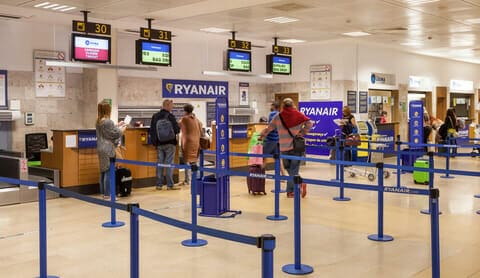
Airport English Conversation #1 – At the Check-In Desk
Dan is flying from New York to Los Angeles. When he arrives at the airport, he goes to the check-in desk. Listen to the conversation he has with the agent:
Agent: Good afternoon! Where are you flying to today?
Dan: Los Angeles.
Agent: May I have your passport, please?
Dan: Here you go.
Agent: Are you checking any bags?
Dan: Just this one.
Agent: OK, please place your bag on the scale.
Dan: I have a stopover in Chicago – do I need to pick up my luggage there?
Agent: No, it’ll go straight through to Los Angeles. Here are your boarding passes – your flight leaves from gate 15A and it’ll begin boarding at 3:20. Your seat number is 26E.
Dan: Thanks.
Download this lesson:
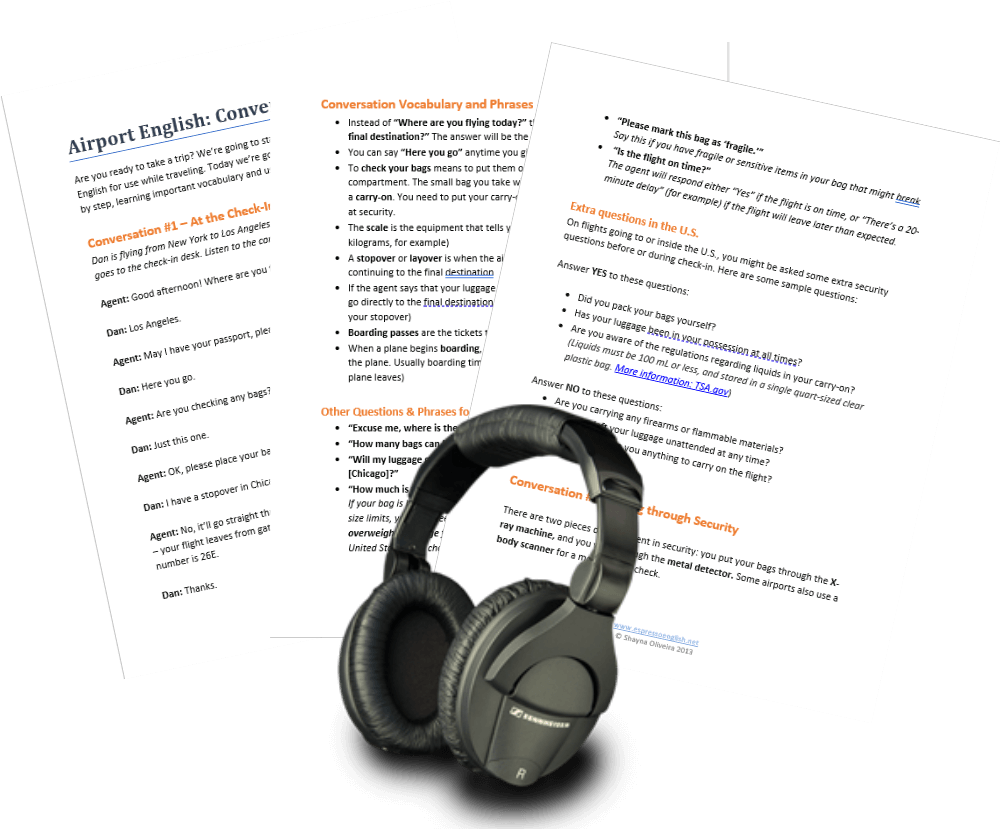
Yes! I want the PDF + Audio + Quiz
Conversation Vocabulary and Phrases
- Instead of “Where are you flying today?” the agent may ask “What’s your final destination?” The answer will be the same!
- You can say “Here you go” anytime you give something to somebody
- To check your bags means to put them on the airplane inside the cargo compartment. The small bag you take with you on the airplane is called a carry-on . You need to put your carry-on bags through the X-ray machine at security.
- The scale is the equipment that tells you the weight of your luggage (45 kilograms, for example)
- A stopover or layover is when the airplane stops in a different city before continuing to the final destination
- If the agent says that your luggage will go straight through , it means it will go directly to the final destination (and you don’t need to pick it up during your stopover)
- Boarding passes are the tickets that permit you to enter the airplane
- When a plane begins boarding , it means that the passengers start to enter the plane. Usually boarding time is 30-60 minutes before takeoff (when the plane leaves)
Other Questions & Phrases for the Airport
- “Excuse me, where is the American Airlines check-in desk?”
- “How many bags can I check?”
- “Will my luggage go straight through, or do I need to pick it up in [Chicago]?”
- “How much is the fee?” If your bag is heavier than the weight limits, or if your bag is larger than the size limits, you may need to pay extra: an oversized baggage fee or overweight baggage fee (this can be $75 to $300) . Some airlines in the United States also charge a fee for ALL checked bags (usually $15 to $30).
- “Please mark this bag as ‘fragile.’” Say this if you have fragile or sensitive items in your bag that might break
- “Is the flight on time?” The agent will respond either “Yes” if the flight is on time, or “There’s a 20-minute delay” (for example) if the flight will leave later than expected.
Extra questions in the U.S.
On flights going to or inside the U.S., you might be asked some extra security questions before or during check-in. Here are some sample questions:
Answer YES to these questions:
- Did you pack your bags yourself?
- Has your luggage been in your possession at all times?
- Are you aware of the regulations regarding liquids in your carry-on? (Liquids must be 100 mL or less, and stored in a single quart-sized clear plastic bag) More information: TSA.gov
Answer NO to these questions:
- Are you carrying any firearms or flammable materials?
- Have you left your luggage unattended at any time?
- Has anyone given you anything to carry on the flight?
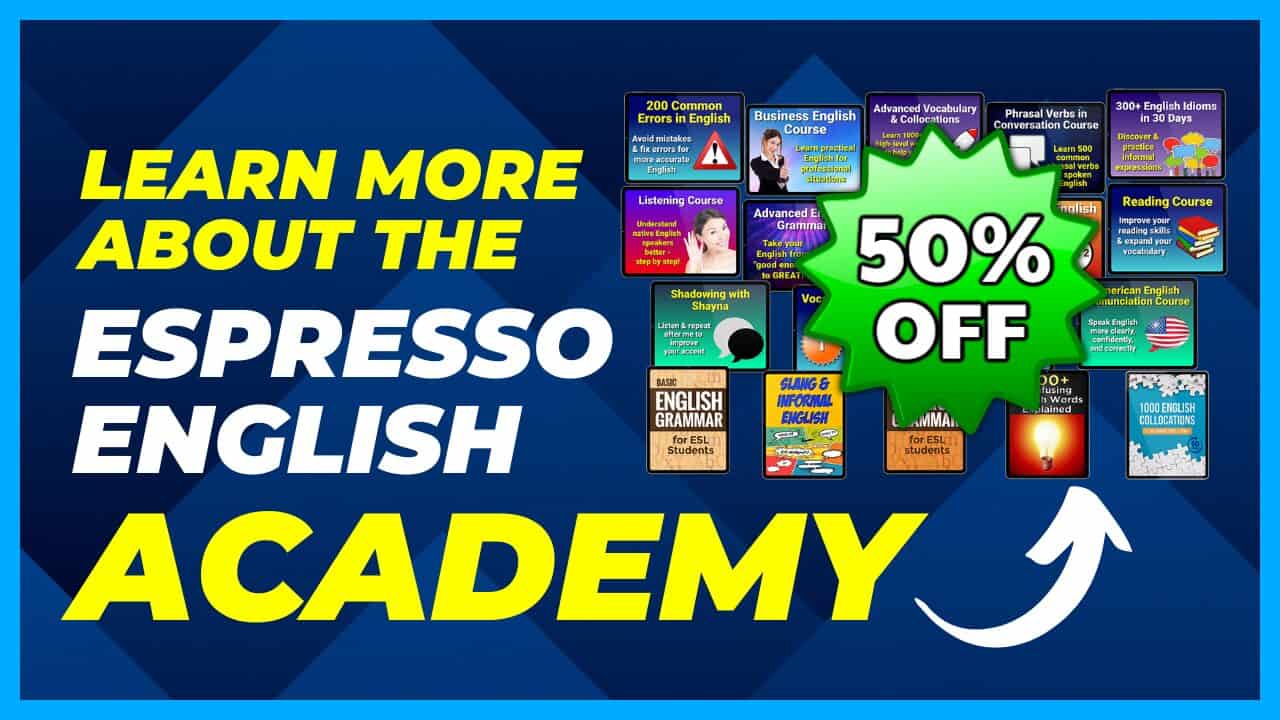
Airport English Conversation #2 – Going through Security
There are two pieces of equipment in security: you put your bags through the X-ray machine, and you walk through the metal detector. Some airports also use a body scanner for a more careful check.
The X-ray machine has a conveyor belt that moves your bags automatically through the machine. You can put small items like keys or money into plastic bins.
In the picture below, the woman is walking through the metal detector. Her suitcase is on the conveyor belt after going through the X-ray machine.
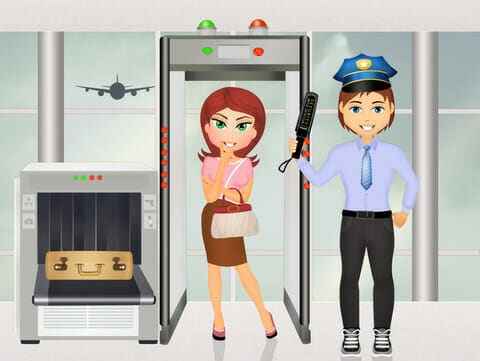
Agent: Please lay your bags flat on the conveyor belt, and use the bins for small objects.
Dan: Do I need to take my laptop out of the bag?
Agent: Yes, you do. Take off your hat and your shoes, too.
(he walks through the metal detector)
[BEEP BEEP BEEP BEEP]
Agent: Please step back. Do you have anything in your pockets – keys, cell phone, loose change?
Dan: I don’t think so. Let me try taking off my belt.
Agent: Okay, come on through.
(he goes through the metal detector again)
Agent: You’re all set! Have a nice flight.
The phrase “you’re all set” is a common expression that means “you’re finished and everything is OK.”
Phrasal Verbs: SET OFF and GO OFF
When the alarm sounds, we say “the alarm went off.” To describe what caused the alarm to sound, we say “set off” – for example, “My keys set off the alarm” or “My keys set off the metal detector.”
Airport English: Announcements at the Gate
Airports are divided into terminals (the major sections of the airport) and each terminal has many gates. The gate is the door you go through to enter the airplane. Here are a few announcements you might hear while you are at the gate, waiting for the plane to board.

- “There has been a gate change.” (this means the flight will leave from a different gate)
- “United Airlines flight 880 to Miami is now boarding.” (this means it’s time for passengers to enter the plane)
- “Please have your boarding pass and identification ready for boarding.”
- “We would like to invite our first- and business-class passengers to board.”
- “We are now inviting passengers with small children and any passengers requiring special assistance to begin boarding.”
- “We would now like to invite all passengers to board.” (this means everyone can enter the plane)
- “This is the final boarding call for United Airlines flight 880 to Miami.” (this means it is the FINAL OPPORTUNITY to enter the plane before they close the doors)
- “Passenger John Smith, please proceed to the United Airlines desk at gate 12.”

500+ Real English Phrases
Airport English Conversation #3: On the plane
The people who work inside the airplane serving food and drinks are called flight attendants. Both men and women who have this job are called flight attendants. Listen to this conversation that Dan has with the flight attendant when dinner is served on the flight.

Dan: Sorry?
Flight attendant: Would you like chicken or pasta?
Dan: I’ll have the chicken.
Flight attendant: Anything to drink?
Dan: What kind of soda do you have?
Flight attendant: Coke, Diet Coke, Sprite, Orange, and Dr. Pepper.
Dan: A Diet Coke, no ice, please.
Flight attendant: Here you go.
English Conversation Tips:
If you didn’t understand what the flight attendant said, you can say Sorry? or Pardon? to ask him or her to repeat it.
If you want to ask for something, you can use the phrase “Can I have…?” or “Could I have…?” Practice your pronunciation with these common requests:
- “Can I have a pillow?”
- “Can I have a blanket?”
- “Can I have a pair of headphones/earbuds?”
- “Could I have some water/coffee/tea?”
- “Could I have some extra napkins?”

Finally, if you need to stand up, but there is a person sitting between you and the aisle, you can say Excuse me and make a motion to start standing up. The person sitting next to you will understand and stand up to let you get out of your seat.
You’ve finished Lesson 16! I hope you’ve enjoyed these English conversations at the airport. Now take the quiz to test how well you remember the airport English phrases.
In tomorrow’s lesson, you’ll learn from more English conversations at the airport – phrases for arriving at the destination airport, going through immigration, and dealing with common travel problems.
Quiz: Travel English at the Airport
Congratulations - you have completed Quiz: Travel English at the Airport .
You scored %%SCORE%% out of %%TOTAL%%.
Your performance has been rated as %%RATING%%
This is a free sample lesson from the Everyday English Speaking Course Level 1
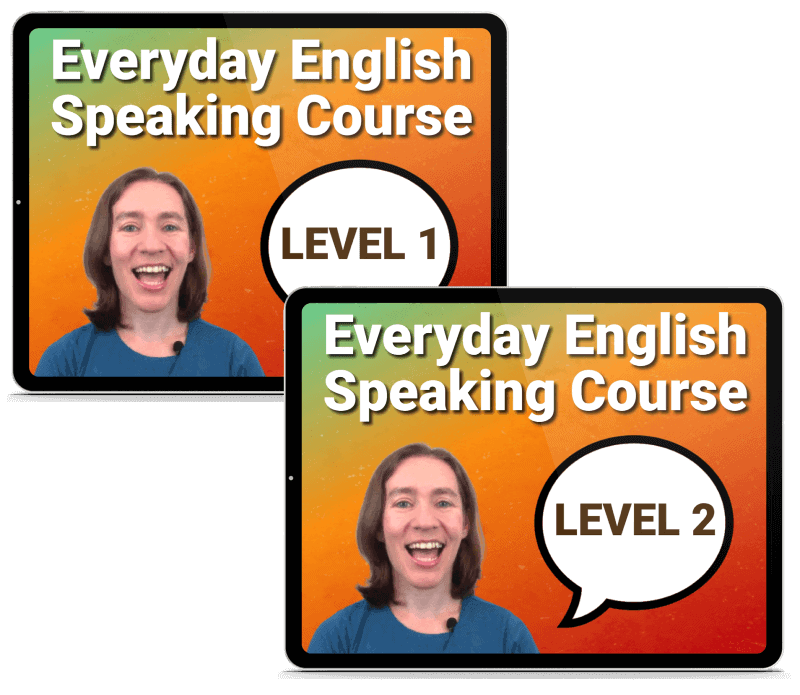
You might also like...
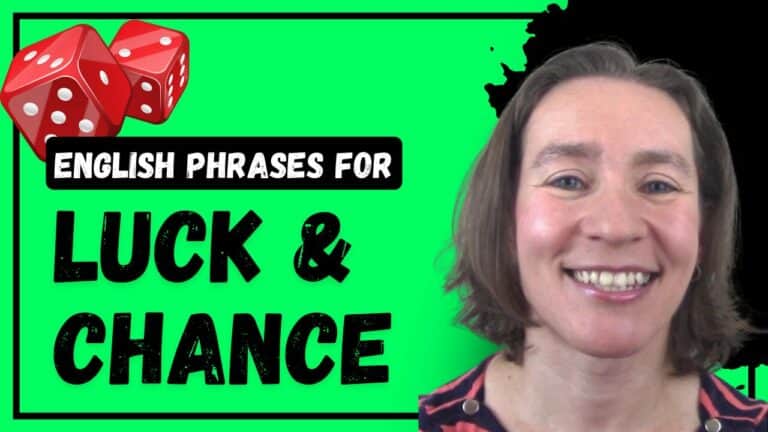

10 English Phrases for Good and Bad Luck

100 Compound Words: List & Examples

100+ GRE Words: Advanced English Vocabulary List

Hi, I’m Shayna. I create courses helping English as a Second Language learners become more fluent in just a few minutes a day – so they can speak English naturally and confidently in work and daily life.

Daily English Conversation Practice by Topic – Lesson List
Download Full Lessons Package – Daily English Conversation by Topic (mp3+pdf)
Listening is THE KEY to better English speaking . The more REAL English conversations you listen to, the more fluent you will become, to be sure.
For a small one-time investment, you can get the whole package of 75 lessons. Put it into your phone or MP3 Player and take your English learning ANYWHERE.
You can learn English on the bus while going to work. You can learn English while exercising or walking. You can learn English while shopping. You can learn English while sitting at a coffee shop, etc.
Remember, DEEP LEARNING is the No. 1 secret to English fluency . If you want to speak English fluently and automatically, you have to repeat the same lesson over and over again until you MASTER it.
WHAT YOU WILL GET:
- 75 mp3 files for 75 lessons (each lesson lasts for 1 -2 minutes).
- 1 pdf file for lesson transcript (79 pages).
Take advantage of your short free time during the day to do a lot of repetition, and you will be amazed at how fast your English speaking improves . Get started today!
P/S: If you want to download more lesson packages with a discounted price, check out 0ur Resources Page here .
Related Lessons
Plastic Surgery
Handcraft Items
Technological Advancements
A Health Problem
A Celebrity
A Creative Person
Leave a Reply:
Save my name, email, and website in this browser for the next time I comment.
Tim's Free English Lesson Plans
Use them, share them, comment on them, and share my link in return.
Holidays and Travelling Conversation Class

Just a quick note…
Before you use these materials… We’ve created a new podcast aimed at B2+ level English students and teachers alike. You can listen for free at our SoundCloud page below. You can download teacher’s notes to accompany them from our Facebook page or from this blog. All comments and feedback welcome! Give us a like and a share 😉
https://soundcloud.com/2tspod
https://www.facebook.com/2tspodcast/
This lesson works well with a range of levels, from A2- C1. It can be used to practice for the FCE or CAE speaking exam collaborative task section. Everybody loves talking about travelling and holidays.
You will need these pictures:
https://skydrive.live.com/redir?resid=79CFF252BEEA0A7D!239&authkey=!ADvu5kRUUPylICk
And this handout:
https://skydrive.live.com/redir?resid=79CFF252BEEA0A7D!240&authkey=!ABZL5DMHal7REDA
First put students in groups to discuss the following questions:
When was your last holiday?
Where did you go?
Who did you go with?
How did you get there?
Then brainstorm different types of holidays and different ways to travel on the board.
Project the pictures from the file above and elicit the vocabulary. This can be fun with lower levels, going from backpack to backpacking to backpacker. Hitchhiking – hitchhiker etc.
Once you have pre-taught all the vocabulary put the students in groups to discuss the questions on the handout.
Students report back to the class about other group members responses. A chance to practice reported speech for higher levels.
Share this:
Author: Tim Warre
Barcelona based English Teacher, blogger and sometime actor and director. View All Posts
One thought on “ Holidays and Travelling Conversation Class ”
- Pingback: Follow up: Homework composition about travelling « Tim's Free English Lesson Plans
Leave a Reply Cancel reply
Discover more from tim's free english lesson plans.
Subscribe now to keep reading and get access to the full archive.
Type your email…
Continue reading
- Excellent ESL 4U Blog
- ESL Learning Tips
- Free ESL Book
- ESL Conversations
- ESL Conversation Cards
- 80 Conversation Cards
- ESL Flashcards
- ESL Listening
- ESL Reading
- ESL Vocabulary
- ESL Writing
- Free ESL Worksheets
- ESL Printables
- Idioms Worksheets
- ESL for Kids
- ESL Kids Vocabulary
- ESL Kids Worksheets
- ESL Games for Kids
- Wordsearches for Kids
- Kids Alphabet Writing
- About Excellent ESL 4U
- Privacy policy
ESL Travel Conversation
You will often need to speak to people when travelling, these ESL travel conversations are examples of natural English travel conversations. They will help you by showing the type of thinks people would say to each other.
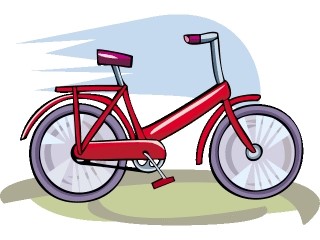
This page has two example travel conversations, both of which have been made into short videos. If you need any help understanding the vocabulary used in the example conversations or the cartoon videos then you can visit the ESL travel vocabulary page for definitions of many of the travel words used.
There are then 3 ESL travel conversation exercises for you to do that will help you practice using travel English. They are:
- A conversation where you have to fill in the blanks.
- Writing your own conversation.
- Some conversation topics so you can talk with your friends.
Conversation 1
Situation: Patrick, Andrew and Jane discuss how to travel to the city from the university campus.
Jane: Good morning, Andrew. Andrew: Good morning, Jane. Are you going somewhere? Jane: Yes. I and Patrick are going to the city to do some shopping and have lunch. Andrew: That sounds fun. How will you get there? Patrick: I want to take the train, but Jane prefers to ride her bicycle. Andrew: Don’t you like using the train, Jane? Jane: The train station is far away and riding my bicycle does not cost anything. Patrick: Ok. Jane, why don’t we travel by bus, there is a bus stop just behind the university. Jane: It might take longer. I think we will need to take two buses to the city centre. Andrew: Jane is right. There is not a direct bus into the city. Why don’t you use a taxi? Patrick: That will be quick, but expensive. Can you rollerblade? Jane: I hope you don’t mean we should rollerblade to the city. Andrew: Is rollerblading popular in America, Patrick? Patrick: Yes. People often use roller-skates. There is even a designated lane for it. Jane: In UK we can’t do that, the path is just for walking on. Andrew: I need to go to the train station to buy some tickets. I can give you both a lift in my car. Jane: That would be wonderful, Andrew. Thanks so much. Patrick: That is very kind of you, Andrew. Let’s go to the city centre!
Conversation 2
Situation: Tui talks with Lucy about her plan to go back to Thailand during half term.
Lucy: What are you doing, Tui? Tui: I’m planning my trip back to Thailand for the mid-term break. Lucy: That sounds exciting. Tui: Not really. I must do a lot of travelling to get back to my home. Lucy: Really? Why? How will you get home and how long will it take? Tui: It will take more than 24 hours because I have to use many different types of transport. Lucy: Will your family meet you at the airport in Thailand? Tui: No. I must take a bus from the airport to my home. The bus is very uncomfortable. Lucy: That does not sound nice. How will you get to London Heathrow airport? Tui: I think it will be cheapest to use the coach, but I have a lot of luggage. Lucy: That’s ok. Usually you can pay extra to take more luggage. Tui: Really? That’s good. Do you know where the bus station is from here? Lucy: Yes, you can walk there. It will only take you 5 minutes. Tui: Should I buy a ticket before travelling? Lucy: Buy your ticket online if you can. It is always cheaper online. Tui: I want to travel direct to London. Do they have direct buses to the airport? Lucy: Yes, it takes about 2 hours. Tui: Perfect! I will take the bus. I was thinking about a taxi, but it’s expensive. Lucy: So, when is your flight? Tui: Tuesday morning. I need to leave really early as I must check in three hours before. Lucy: Would you like to take some of my delicious homemade cake for your family? Tui: Thanks, Lucy. But I don’t think I can. The customs officer is usually really strict. Lucy: I understand. Have a safe journey and see you when you get back. Tui: Thanks, Lucy. See you soon!
ESL Travel Conversation Exercises
The 3 following ESL travel conversation exercises will help you get better at using English to have a conversation about traveling.
Exercise 1 – Fill in the Blanks
In this ESL travel conversation exercise you need to choose the correct option (A-D) to fill in each of the blanks in the following conversation. Once you have chosen the option to fill each blank just click on the get results button to show your score and the correct answers.
Situation: Bob travels by bus to the city centre.
Bob: Excuse me, driver. _____(1)_______. Driver: Yes. We go directly to the city centre. Bob: That’s great. I would like one ticket, please. Driver: _______(2)__________. Bob: No, I don’t. Driver: ________(3)___________. Bob: I would like a return ticket please. Driver: That will be 2.40, please. Bob: Here you go. ______(4)________. Driver: Yes, please press the buzzer when we get near, there is a bus stop opposite the mall. Bob: Thank you. How often do the return buses leave and when is the last bus this evening? Driver: Buses run every hour and the last bus is at 2 am. Bob: Thank you. You have been very helpful. Driver: You are welcome. No problem at all. ________(5)_________.
ESL Conversation
Exercise 2 – write a conversation.
For the second ESL travel conversation exercise you need to write a conversation that is similar to the ones above. You can chose what happens and how many people there are, but it should be related to travel. Write what each person would say to the other people. Once you have finished you should find a friend and then you can speak the conversation out loud to each other.
Exercise 3 – Conversation Topics
In this exercise there are two sets of ESL travel conversation topics. Working with a friend you should have a conversation where you answer the question. One person has set A and askes those questions to the person who has set B. Take turns to asks questions.
The questions have also been made into some conversation cards for you to download by clicking the picture.
Do you want to practice speaking more? Then download my ‘ 80 ESL Conversation Cards ’ ebook that has many more conversation questions.
Question set A
- What is the longest journey you have ever taken?
- Would you like to be the captain of a ship, why?
- How many different types pf transport have you ever used?
- Is it safe to travel in the country you come from?
- Have you ever had an accident while travelling?
Question set B
- Do you like travelling? Why?
- What do you like to do while travelling?
- Would you like to be the captain of an airplane, why?
- What is your favourite method of transport?
- Do you get ill when travelling?
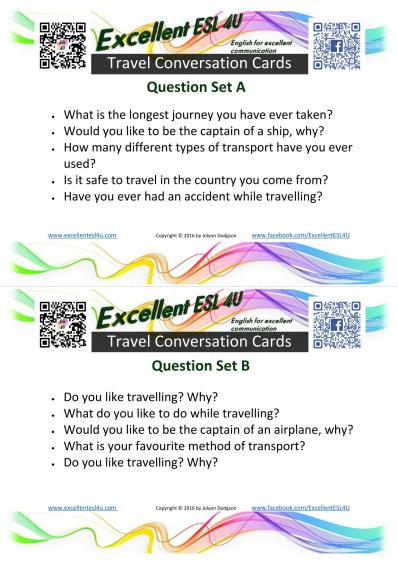
Other Pages about Travel that You Might Like
ESL Travel Listening ESL Travel Reading ESL Travel Vocabulary ESL Travel Writing
Excellent ESL 4U
New! Comments
Learn english, english idioms, kids english, contact excellent esl 4u, site information, recent articles, esl new year listening.
Dec 18, 16 03:17 AM

There are several ESL New Year listening tasks for you to do on this page so you can learn how to listen to the vocabulary.
ESL New Year Writing
Dec 11, 16 03:40 AM
This page has a range of ESL New Year writing exercises for you to do.
ESL New Year Conversation
Dec 04, 16 02:07 AM
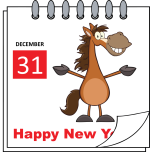
There are example ESL New Year conversations on this page as well as some exercises and activities.

By Jolyon Dodgson , copyright © 2014-2020
www.excellentesl4u.com
Image © Graphics Factory.com

Want to create or adapt books like this? Learn more about how Pressbooks supports open publishing practices.
3 Talking about Travel and Experiences
In this chapter, you will learn about:
- Wh and Yes/ No question formation
- Intonation in English
- Opening, closing and extending basic conversations

“The world is a book, and those who do not travel read only a page”
– Saint Augustine
Discussion Questions
- Read the quotation above. What does it mean?
- Do you like to travel? Why or why not?
Chapter 3 Vocabulary
view (n./v.) produce (v.) develop (v.) remember(v.) decide (v.)
argue (v.) achieve (v.) challenge (n./v.) introduce (v.) ability (n.)
Use your dictionary to find the meaning for the vocabulary words in the box above. Then write the words from the box next to their definitions below.
An opinion or way of thinking about something: .
To get or reach something by working hard: .
To make someone or something known by name: .
The power or skill to do something: .
To cause something to grow or become bigger: .
To make a choice about something: .
To keep an idea or image in your mind: .
A difficult problem: .
To give reasons for or against something: .
To make or create something: .
Part 2: Syllables
Listen to the pronunciation of the vocabulary words. Write the number of syllables that you hear in each word. The first word has been done for you.

- introduce =
- challenge =
Activity 2 Part 1
Read the conversation and complete the missing words with the chapter 3 vocabulary words below. You will not use three of the words.
Sam : Hey Tina! I haven’t seen you all year! How was your trip to Brazil last year?
Tina : Hey Sam! I know! It’s been a long time since I’ve seen you. My trip was great. I had a few that were kind of difficult, but it was a good trip overall.
Sam : How did you to visit Brazil? Had you traveled there before?
Tina : No, I hadn’t, but my friend me to some Brazilian people and they were very nice, so I bought a ticket and went.
Sam : Cool! Do you any interesting things that you did while you were there?
Tina : Well, my friend that I went with actually short travel films, so he made a movie about our trip. It shows all the places we went. I’ll give you the website, so you can watch it.
Sam : Wow! That sounds great! It’s not easy to travel with a friend. Did you or fight with each other?
Tina : No, not really. We got along great, and we had so much fun.
Sam : That’s great to hear. Would you return in the future?
Tina : Yes, definitely! If I have the , I will return in the future .
Sam : Cool. Well, it’s great to see you!
Tina : You too! See you around!
Sam : You too! Bye!
Activity 2 Part 2

Chapter 3 Activity 2
Grammar Point: Questions in English
There are two types of questions in English: Yes/ No questions and WH questions.
Yes/No questions
Begin with these verbs: Do/ Does — Is / Are
They are answered with a “Yes” or a “No”.
The be verb (is/are) is used to start questions when a noun or adjective follows the subject.
Question: Is Ms. Brown a teacher ? (noun)
Answer: Yes, she is.
Question: Are the students happy ? (adjective)
Answer: No, they aren’t.
The verbs ‘do’ or ‘does’ are used to start questions when a verb follows the subject.
Question: Does she work here? (verb)
Answer: No, she doesn’t.
Question: Do they speak English? (verb)
Answer: Yes, they do.
W H questions
Follow the same grammar rules, but they begin with the question words:
Who, What, When, Where, How, Why
WH questions have longer answers, not just “yes” or “no”
Where does she live?
She lives downtown.
When is your class?
I have class on Monday and Wednesday.
Look at the answers below. Write a question that matches the answer. Think carefully about the grammar in the answer.
Question =?
Answer: No, they are from Canada.
Answer: She works at a bank.
Answer: My birthday is June 22nd.
Answer: Yes, I’m a student here.
Discussion Activit y
You and your best friend are taking a vacation for spring break. You are deciding between two kinds of vacations. First, ask your partner the WH questions below, so you understand what kind of vacation they like.
- What kind of weather do you like?
- Do you want to exercise or relax on vacation?
- Do long flights annoy you?
- What is your budget (how much money can you spend)?
- How long do you want to go for?
Now, study the information below about the two vacations. Together, with your partner, choose one vacation. You must agree with your partner on the same vacation.
Which vacation will you choose? Why?
Vacation #1: Ski Vacation in Canada
- 2-hour flight from Portland
- Cold, snowy weather
- Hotel includes hot tub and swimming pool
- English language is spoken
- Breakfast and dinner included
- Opportunities to ski and snowboard
- $3,000.00 for 6 days
Vacation #2: Beach vacation in the Maldives
- 18-hour flight from Portland
- Hot, sunny weather
- Hotel is right on the beach
- Some English is spoken
- No meals included
- Opportunities to swim and dive
- $3,500.00 for 5 days
Speaking Tip: Intonation
In the English language, the sound of a person’s voice goes up or down when they say the last word of a question or sentence. This difference in sound is called “intonation”.

- WH questions = falling intonation (voice goes down)
- Yes/No questions = rising intonation (up)
- Statements = falling intonation (down)
- Exclamations (excited speech!) = rising then falling intonation (up then down)
Practicing Intonation
Practice activity 1.
Directions: Listen to the questions and circle the type of intonation you hear.

Listening for Intonation
Practice Activity 2
Directions: Using the intonation examples on the previous page, decide if the questions and statements below have rising or falling intonation. Draw an up or down arrow next to each number. The first one has been done for you.

- I travel as often as I can.
- What is your favorite country?
- Are you from Japan?
- I love to travel!
Practice Activity 3
Directions: Ask your partner the questions below. Practice using correct intonation.
- Where are you from?
- When was your last vacation?
- Do you like to travel on trains?
- What is your name?
- Have you been to New York City?
- Where is your favorite place to travel in the world?
Speaking Tip: Conversation Continuers
These words are used to show interest or understanding in a conversation and to make conversations last longer. Study them and include them in your English conversation.
To show interest
- Tell me more.
- That’s interesting.
To show concern
- Oh, that’s too bad.
- I’m sorry to hear that.
- What happened?
To show excitement
- That’s great!
To follow up
- What about you?
- Tell me about you.
- Enough about me.
- Let’s talk about you.
Directions: Using the words and phrases from above, work with a partner to complete the conversation below. Then practice reading the conversation using correct intonation.
A: Hey! How are you?
B: I’m not that good.
A: ?
B: Well, I missed my flight. Now I have to pay extra to fly tomorrow.
A:
B: Yeah. ?
A: Well, I’m actually great! I feel so happy today!
B: ?
A: I just got married this weekend.
B: !
A: I know! I’m so happy. But, I’m also feeling worried because of my busy schedule.
B: .
A: I’m going on a vacation next week, but I have so much work to do before then.
A: Well, good luck with your flight tomorrow!
B: Thanks! It was nice to see you!
A: You too! See you later!
Speaking Fluency Practice
Ask the questions below to your classmates. Use the conversation phrases on the page before to keep the conversation going back and forth.
- Do you like to travel?
- What is your favorite place you have traveled to?
- Do you like to travel alone or with people?
- When was your last trip?
- Do you like to fly on airplanes?
- Is it expensive to travel around your country?
- Do you like to achieve something when you travel or just relax?
- How do you decide where to go when you travel? Do you plan in advance?
- What do you remember about your best travel experience?
- When will you go on your next trip?

Hiking, by Maxmann
Homework survey
Directions: Ask five Americans or good speakers of English about their travel experiences. Listen and write their answers below.
- Where is your favorite place to travel?
- How often do you travel?
- How many countries have you travelled to?
- Where should I travel in the U.S.?
- Where should I travel in the U.S.
Chapter 3 R eview
- In this chapter, you learned about:
- How to make WH and Yes/No questions in English
- How intonation sounds in questions and statements in English
- Useful phrases for continuing conversations
Extra Listening Practice
- Keren compares ways to travel, such as travelling alone or with a friend.
- Greg gives travel tips on how not to get lost in a new location.
- David talks about the many places he has visited around the world.
Communication Beginnings Copyright © 2018 by Della Jean Abrahams is licensed under a Creative Commons Attribution-NonCommercial 4.0 International License , except where otherwise noted.
Share This Book
You are using an outdated browser. Please upgrade your browser or activate Google Chrome Frame to improve your experience.
Travel English Phrases
English is essential for communication in most countries.
Wherever you are going, you need to have a good grasp of the basics of the language to get around and communicate at the airport, hotel and everywhere in between.
This post has dozens of travel English phrases to help you navigate any foreign country. Learn what they mean and how you can use them!
At the Airport
On the airplane, arriving at your destination, riding public transportation, at the hotel, at a restaurant, sightseeing, emergencies, and one more thing....
Download: This blog post is available as a convenient and portable PDF that you can take anywhere. Click here to get a copy. (Download)
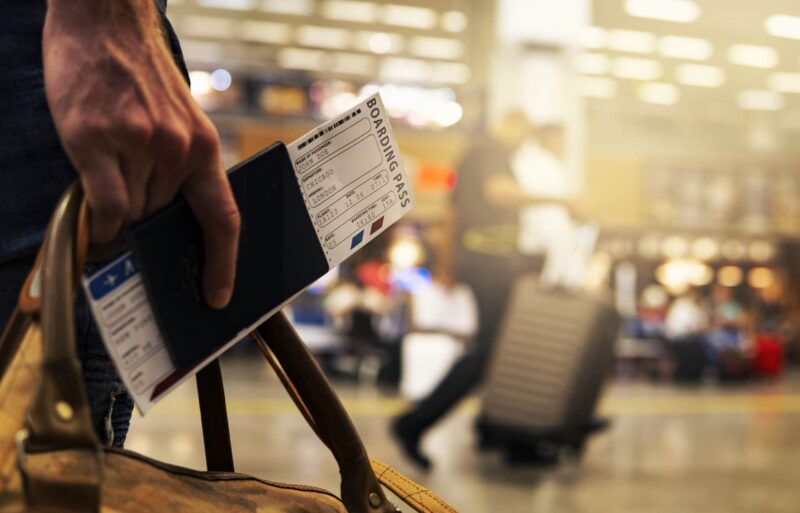
Excuse me, how do I… ?
If you are flying for the first time, you will need information on how to:
- Check in. When you check in , you are letting the airline know you have arrived. If the person you are talking to tells you to go to the check-in counter, you can follow up this question with “how do I get to the check-in counter?” to get directions. At the check-in counter, you present your ticket , a document that allows you to get your boarding pass. The boarding pass, in turn, will allow you to board (ride) your airplane.
- Board the airplane. If you are not sure about what you should do before you get on a plane and during your flight, you can ask the airline staff about this.
Where is the… ?
You will likely ask for general directions to one or more of the following:
- Information desk. As you can guess from the name, the information desk is where you can learn everything you need to know about getting around the airport. You can even ask for a map (a picture guide of the area) from them.
- Gate. A gate is where you will enter to get to the airplane. It is also the place where you wait before boarding your flight. The gate is usually written on your boarding pass.
- Restroom. A restroom is a place where you take care of personal business like combing your hair, washing your face or using the toilet. Depending on the country you are visiting, this room may also be called a bathroom , washroom, comfort room, loo or toilet .
- Charging station. If your phone has low or no battery, these places can get your device’s battery up to 100 percent again.
- Restaurant. If you feel hungry while waiting for your flight, you can visit a restaurant where you can eat in the meantime.
How do I get to… ?
Although they both seem to ask for directions, there is a slight difference between “where is the… ?” and “how do I get to… ?”
“Where is the… ?” will get you a general answer like “(The place you want to go to) is at Building A.”
Meanwhile, “how do I get to… ?” asks for specific directions, so the person you are talking to will reply with “From here, you turn left, and when you see this sign, turn right…” and so on.
What time is my flight?
Often, it may not be clear what time your specific flight is—in which case, this question will be useful.
What items am I allowed to bring on board?
Airlines usually have rules on what you can and cannot take into the airplane.
How much luggage am I allowed to carry on?
Your luggage includes all the bags you are bringing with you for the flight. Airlines often have limits on how much and how heavy your luggage should be.
Are meals included?
A meal is a collection of food served at one time. Not all airlines provide meals, so it may be good to ask if you will get these before you board.
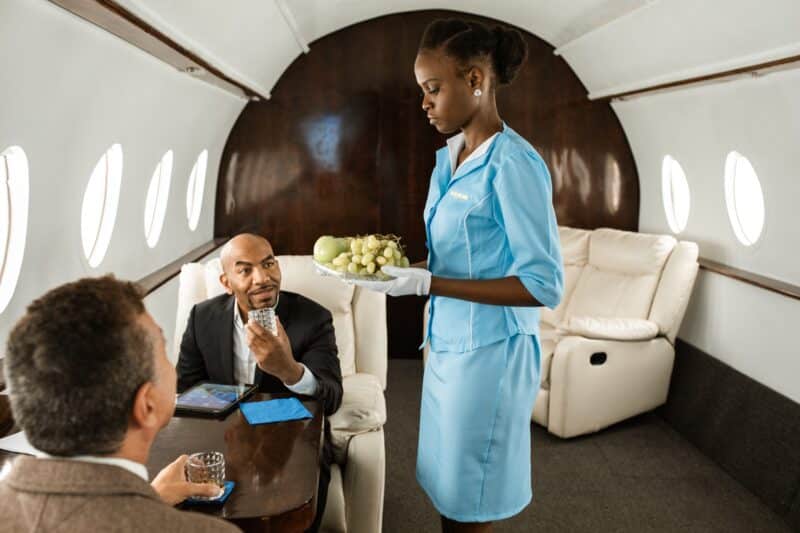
Excuse me, can you please help me put my luggage away?
Airplanes have baggage compartments or closed spaces above each of the seats. You can ask the flight attendant, an airplane employee in uniform who is usually female, to help you put your luggage in its compartment.
Can I please change my seat?
Once you get on the plane, you may want to change your seat because other seats are more comfortable, have a better view, etc.
How much does… cost?
You can ask about the cost of anything you want to buy like the following:
- water bottle
- snack (a small meal)
I would like… , please.
This phrase is the standard and polite way to ask for something that is usually free or something you do not have to pay for. For example, if you are thirsty, you might say “I would like a glass of water, please.”
Does my seat have… ?
For example, if you want a device to return your phone’s battery charge at or above acceptable levels, you can say “does my seat have a charging port ?” And if you want to move the seat back so you can lie down, say “does my seat have a recline button ?”
Excuse me, I need to…
There are a few things you can ask permission for on a plane. You can say “Excuse me, I need to…”
- Get out of my seat
- Use the restroom
- Move my luggage
What time is it?
This is a standard question for figuring out what time of the day it is. It is useful when you are flying over different time zones and when the plane finally lands.
For more vocabulary and phrases related to air travel, take a look at this post—it’s aimed at flight attendants, but you’ll learn a thing or two as well!
Knowing English for flight attendants is essential in today’s interconnected world. These 60+ English words and phrases will prepare you for the job before, during and…

Once you are at your destination (the place you are visiting), some of the useful phrases you can use are the following.
Just like at the airport when you first arrived, “Where is the… ?” and “How do I get to… ?” are useful phrases when you are at your destination.
Some of the places where you might need directions are:
- Baggage claim area. Remember when you checked in your luggage? This is the place where you claim or get it.
- Currency exchange. A currency exchange is a place where you take the money you use in your own country and get it changed to the money used at your destination.
- Bus stop. Finding a bus stop will be especially helpful if you want to find a cheap way to get around. Asking “where is this bus going?” can also help you know if you are riding the right bus.
- Taxi / Taxi stand. No bus? Take a taxi instead, which is also called a cab in some places. You can usually find a group of taxis at taxi stands.
- Hotel. Of course, you should provide the name of your specific hotel.
- Immigration or customs. Immigration or customs is the place where you have to explain why you came to a country and tell officers what your intentions are.
Sorry, I do not understand what you are saying.
This phrase will help native English speakers know English is not your first language. You can also say “I do not speak English very well” and ask them to “please speak slowly” if you are still having trouble.
I recommend that you prep before you go by studying authentic English media like movies and TV shows. These can help you prepare for real interactions in English.
FluentU takes authentic videos—like music videos, movie trailers, news and inspiring talks—and turns them into personalized language learning lessons.
You can try FluentU for free for 2 weeks. Check out the website or download the iOS app or Android app.
P.S. Click here to take advantage of our current sale! (Expires at the end of this month.)

Try FluentU for FREE!
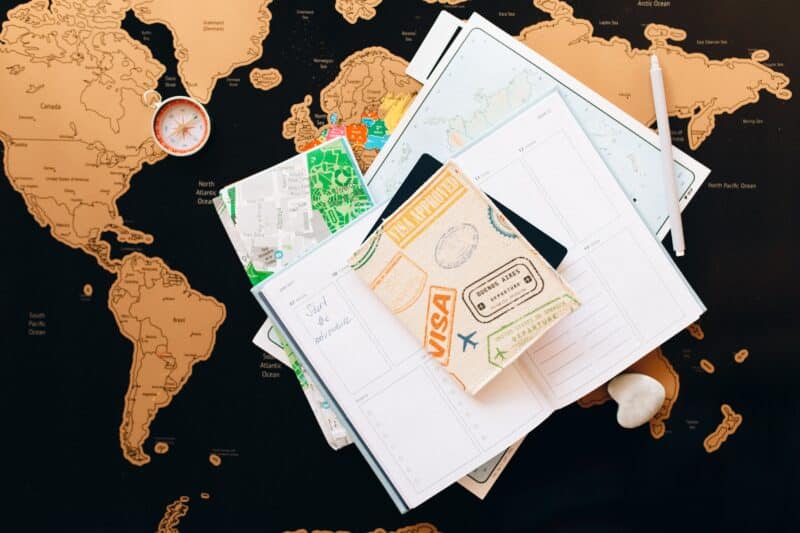
I have items to declare.
Aside from explaining why you are in a certain country, you also have to declare (make a formal or official statement on) the items that you may need to pay duties (taxes on items from another country) for.
If you do not have such items, you can simply say “I have nothing to declare.”
I have a connecting flight.
This is how you say you will board another plane to go somewhere else.
I am traveling for…
Depending on why you came to the country, you can say you are traveling for:
- Leisure. Say this if you are traveling because you are on vacation.
- Work. Say this if you are traveling because your company asked you to .
- Family. If you are traveling because you are visiting relatives, let the customs officer know.
I will be here for… days.
You will need to provide the number of days you will be staying in the country, like “I will be here for 90 days.”
If you have it, you can also show your visa , a document that proves you are allowed to enter the country for a certain purpose within a certain period.
I am staying at…
The customs officer may ask you where you will be sleeping. You can say “I am staying at (the name of your hotel)” or “I am staying at (the address of your family or friend in the country).”
Check out more airport vocabulary here .
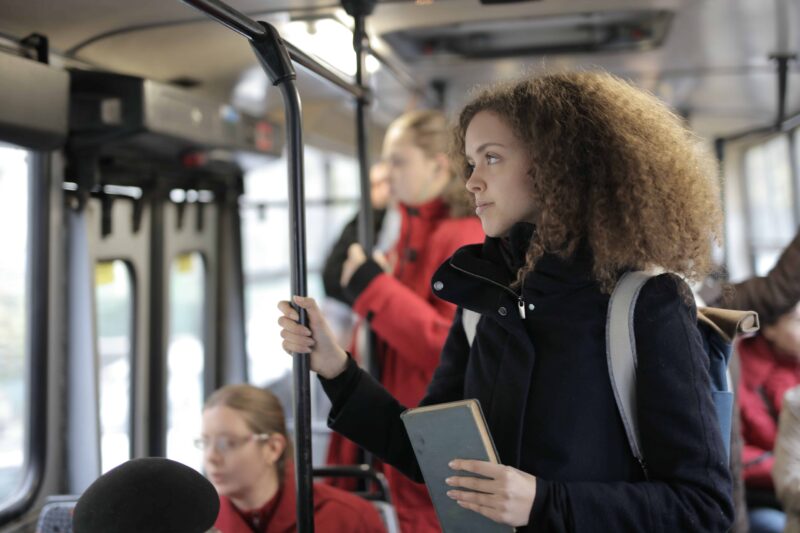
Now that you have arrived, you need to know how to get around. Here are some useful phrases you can use whether you are riding a bus, train or any other form of public transportation.
Does this go to… ?
Before you get on a bus or train, ask whether it is going to the place you want to go. If the driver says no, you can ask “how do I get to… ?” and take note of the directions they give you.
How long does it take to get to… ?
Here, you are asking how many minutes, hours, etc. it will take for the vehicle to get to your destination.
How much is the fare?
The fare is the price of riding your public transport.
“Do you accept… ?”
End this question with a mode of payment , which includes cash and cards .
Excuse me, is this seat taken?
This phrase is useful if you see someone with an empty seat beside or near them, but you want to be 100% sure they do not have a companion.
I missed my stop. Can you please let me know when we are at the next one?
In an ideal world, traveling would go smoothly. But sometimes, things like not being able to get off at your stop happen! Luckily, you can use this phrase to get you out of a pickle (get you out of trouble).
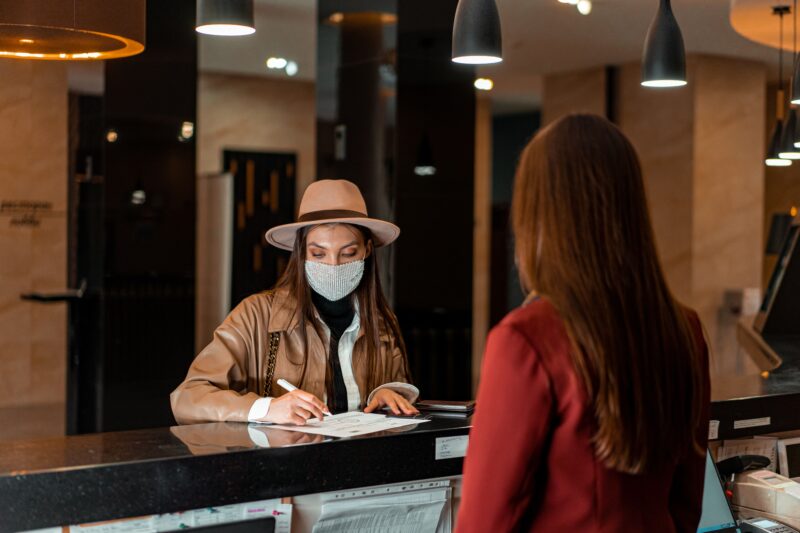
Of course, if you are staying with friends and family, you can skip this section. But if you will stay at a hotel, keep the following phrases in mind.
Greetings! I have a reservation under the name of…
End the phrase with your full name or the name you used to make your reservation.
When you get to your hotel, go to the front desk. It is easy to find because that is usually where you will first meet the hotel’s employees. Also, that is where the other guests will probably be!
You want to confirm that you have a reservation first—that is, proof that you have a room at the hotel where you are staying. Otherwise, you have to look for somewhere else to stay.
What is included in my reservation?
This question asks what services you have already paid for. Of course, there is your room, but you may also want to check for other things like breakfast, pool, spa, etc.
What time is check-in / check-out?
Since you will not be staying at the hotel all the time, you will want to know what time you can check in and check out.
Check in means the time you will be allowed to enter your room, while check out means the time you should leave your room.
Does the room have a… ?
You may also want to know about your room’s amenities (things to help make your stay more convenient and comfortable). For example:
- Bathroom / restroom. Again, the correct term for this place depends on where you are.
- Refrigerator / fridge. A refrigerator or “fridge” is a place to keep your food and drinks cold. Keep in mind that you may have to pay extra for any food or drinks you take out of hotel refrigerators.
- Wi-Fi. Wi-Fi is simply a wireless internet connection. You should probably also ask for the Wi-Fi password. ( “What is the Wi-Fi password?” )
- Air conditioner. An air conditioner is a piece of equipment that cools a room.
How many beds are in the room?
This question will help you know if there is enough space to sleep for the number of people in your hotel room.
What floor am I on?
A floor in this situation refers to the level of the hotel.
If you are on a high floor (like the 30th, for example), you may want to use the elevator , the device that lifts and lowers you between floors of the hotel, to help you get to your room.
My room needs…
Most of the time, housekeeping (the people who clean the room) will make sure you have everything you need. Should they forget, you can say “My room needs…” and finish with:
- Towels. Towels are soft, thick materials you use to dry yourself after taking a bath.
- Toilet paper. Toilet paper are thin white sheets rolled up on tubes. They help you wipe yourself in the bathroom.
- Bedsheets. “Bedsheets” is a term that includes pillowcases, blankets and all the other pieces of cloth that cover your bed.
Could I please have room service ?
As a guest, you can request services by saying “Could I please have… ?” For example, you can request room service , where someone will come up to your room to deliver food, drinks and other things you may need.
Where is the best… around here and how do I get there?
Since the hotel employees are locals, they will probably know the area more than you do.
Before you check out of your hotel, you can use this phrase and replace “…” with:
- Grocery store. Grocery stores are places where you can buy most types of items.
- Hospital. If you or someone you are traveling with gets sick or injured, you need to know where to go.
- Bank. If you run out of money, you may need to go by a bank to get more.
- Restaurant. Make sure you ask for a restaurant that offers local cuisine or food.

A table for two, please.
The number indicates how many people will be eating with you at the restaurant. It does not have to be just two: it can be any number of people with and including you.
I would like to drink…
Finish this phrase with the name of the drink you want. Popular drinks are:
- soda pop (carbonated sweet drinks)
May I see a menu?
A menu will help you decide what you want to eat.
I would like to order, please.
Once you have decided what to eat and drink, raise your hand and wait for a waiter to come to your table. Then, say this phrase to indicate that you are ready to order or ask questions about the food.
Could you recommend any popular dishes?
This is a good question to ask if you are not sure what to order.
May I ask if you have dishes that are… ?
You may prefer certain foods to others for personal reasons. For example, you can finish the question with any of the following:
- Vegetarian / Vegan When you say that dishes are vegetarian , that means they are mostly made of plant-based ingredients. When you say they are vegan , it means they do not have any animal ingredients (even eggs or milk!) at all.
- Halal. If you are a Muslim, you want to make sure that what you eat does not go against the laws of your religion. You may need to explain what ingredients make a food halal or haram , though.
Can you tell me about any potential allergens in this dish?
Allergens are ingredients in your food that can cause you to have a negative reaction. It may be a good idea to ask about these before you order a dish. The last thing you want is to not enjoy your meal because you got sick!
Can I please have… ?
Fill in the blank with an item off of the menu or one of these items:
- Appetizer. An appetizer is a small dish you eat before the main course (meal).
- Soup. Soup is a common way to start meals.
- Salad. If it is too warm for soup, try a salad!
- Dessert. A dessert is a sweet dish you eat after the main course.
- A glass of water. If you are not interested in any particular drinks, a glass of water is always a good option.
- Extra sauce / salt / spice. If you think your dish could use a little more sauce, salt or spice, you can ask if you can have more.
Can I ask for a refill?
The word refill comes from the prefix re- (which usually means “to repeat”) and fill . If your glass of water is empty and you want more, you can ask for a refill so your empty glass will have water again.
May I have the bill?
The bill indicates how much you have to pay after you eat the meal. Make sure to ask for this. In some restaurants, the waiters will not bring it to your table unless you ask.
If you want more useful English phrases to use in restaurants, check out this post on ordering food in English .

Of course, your trip would not be complete without souvenirs or items you buy to remember the place you visited! To make the most of your visits to shops, here are a few phrases to keep on hand.
Excuse me, where can I find… ?
Finish the question with what you are looking for.
Excuse me, how much is this?
This is a standard phrase for asking the price or cost of items.
Do you offer discounts?
When you ask for discounts , you are asking if the item comes at a lower price. Usually, the discount is shown in percentages (%). For example, if an item is $10 and there is a 50% discount on it, the final price would be $5.
Do you have a sale?
Another way to save money is to watch out for sales or events when you can buy items for much lower than their original cost.
Does this come in a bigger / smaller size?
If you are buying clothes, you may not be able to find something that fits you. In that case, use this phrase to check if they have your size. You can also ask “can I try this on?” to make sure the piece of clothing really fits!
What is your return and exchange policy?
Sometimes, you end up buying an item that you do not like or has defects (something wrong with it). A return and exchange policy allows you to either return (give back) the item to the store or exchange (switch or change) it with a similar one.
What forms of payment do you accept?
Here, you are asking if they accept cash, cards or any other form of payment you have on hand.
Can you recommend something similar to this?
If you find something you like but not quite or you want more varieties (colors, sizes, etc.) of the same item, this is a good question to ask.
For more shopping vocabulary you should know, go here .

Aside from the stores, you also want to check the sights and sounds of your destination! For those, here are the phrases you can use.
Where is the visitor information center?
The visitor information center is where you can get everything you need to know about an area—maps, landmarks, restaurants, shops, etc.
Excuse me, can you tell me what attractions I should check out around here?
There may be so many attractions in the area, you will not know where to start. This question can help you make your itinerary or travel plans for the day.
Are there any guided tours for this area?
Then again, you may not need to explore the area on your own. With a tour guide , you can plan where you want to go, get information on each attraction and even some interesting tidbits (facts) about them!
Are there any rules and restrictions I should know?
As a visitor, the last thing you want is to get into trouble. You want to know what you should do (the rules) and what you should not do (the restrictions).
Can you take a photo of me in front of… ?
A trip is not complete without pictures you can post on social media! There are times when you may want to take pictures of yourself in front of a site and that is where this phrase comes in.
Are there any events or festivals around here?
If you want to enjoy the place the way the locals do, this is a question you should ask.
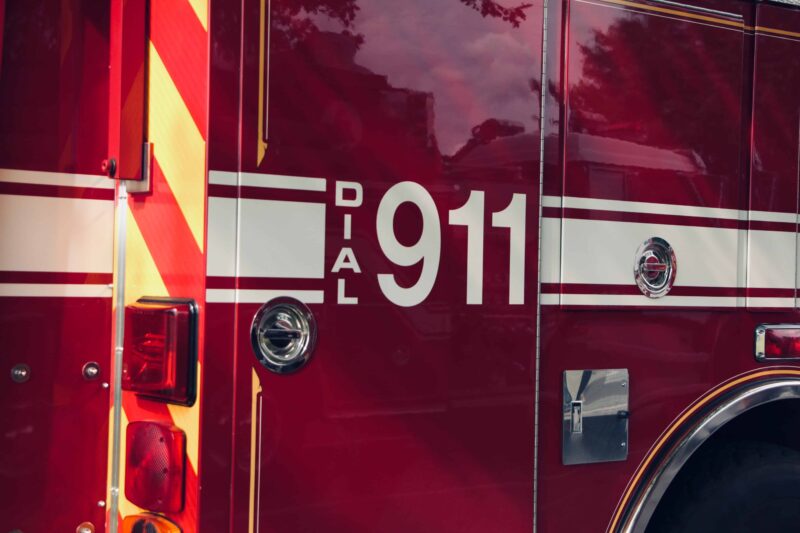
Even with careful planning, you may encounter some problems with your travels. Here are some phrases to help you out if something bad happens.
I have lost my…
End this phrase with any valuables (important items) you lose, such as:
- Passport. If you lost your passport, you need to find an embassy or state organization that represents your home country in the place you are visiting. To ask for directions to the embassy, say “where is the embassy for… ?” and end the question with your country’s name in English.
- Wallet. If someone stole your wallet or something else from you, you need to contact the local police , the organization responsible for dealing with crimes. In the United States, for example, you can call 911 on a phone.
- Way. When you say you have lost your way , you mean you are not sure where you are and where you should go. If you have a destination in mind, you can say “how do I get to… ?” and end the question with where you want to go.
If something bad is happening to you, calling out this word will get people’s attention and—hopefully—get you the help you need.
I feel…
Sometimes, the people who come to help you may need more information about what you need help with. For example, you could say “I feel…”
- Dizzy / Faint. Dizzy or faint means your head feels light, as though it is being turned around and around.
- Sick. If you do not feel well in any way, you should say “I feel sick.”
If your body hurts, you can also say “I am in pain.”
With these travel English phrases, you should be able to get around most countries without much trouble.
Enjoy your trip!
If you like learning English through movies and online media, you should also check out FluentU. FluentU lets you learn English from popular talk shows, catchy music videos and funny commercials , as you can see here:

If you want to watch it, the FluentU app has probably got it.
The FluentU app and website makes it really easy to watch English videos. There are captions that are interactive. That means you can tap on any word to see an image, definition, and useful examples.

FluentU lets you learn engaging content with world famous celebrities.
For example, when you tap on the word "searching," you see this:

FluentU lets you tap to look up any word.
Learn all the vocabulary in any video with quizzes. Swipe left or right to see more examples for the word you’re learning.

FluentU helps you learn fast with useful questions and multiple examples. Learn more.
The best part? FluentU remembers the vocabulary that you’re learning. It gives you extra practice with difficult words—and reminds you when it’s time to review what you’ve learned. You have a truly personalized experience.
Start using the FluentU website on your computer or tablet or, better yet, download the FluentU app from the iTunes or Google Play store. Click here to take advantage of our current sale! (Expires at the end of this month.)
Related posts:
Enter your e-mail address to get your free pdf.
We hate SPAM and promise to keep your email address safe


Airport - Hotel
Buying tickets
Videos: airport, hotel ..
Travelling - tourism
Exercises - vocabulary 2.
TRANSPORTATION: TRAINS / CARS...
- Tickets (train/bus tickets)
- Tickets 2(train/bus tickets)
- Tickets (plane, train ..) 1
- Tickets (plane, train.. ) 2
- Tickets (plane, train.. ) 3
- Buying tickets (ferry/boat)
- Train / car / plane - exercises
- Trains: What's wrong?
- Driving 1: At the gas station
- Driving: What's wrong?
More exercises: Restaurant - Shopping - Sightseeing - Meeting people
Dialogues - small talks
- Taking the bus - small talks
- At a hotel - small talks
- At a restaurant - small talks
- Hotel dialogues - English vocabulary
- Travel - small talks
- At the bank - small talks

IMAGES
VIDEO
COMMENTS
Lesson 1 - At the Airport. Hello and welcome to Lesson 1 of the Travel English Speaking Course! Today we're going to go through the airport step by step, learning important vocabulary and useful phrases along the way. Let's imagine you're flying from New York City to Los Angeles. Situation 1: At the check-in desk. Agent: Good afternoon!
all suitcase. There's a pocket for my travel documents and inside there are two parts - one for clothes and one. or my laptop.I never travel with. ut my laptop. Unit 9 Travel. there is/are7 Look at th. grammar box. Then look a. the article. Underline the sentences with there's. theRe IS/ARe.
Story Writing, Speech Writing, Letter Writing, Expansion of Ideas (Proverbs), Expansion of Idioms, Riddles with Answers, Poem Writing and many more topics. Plus Access to the Daily Added Content. ₹499.00 ₹150.00. Shop now. Travel Conversation in English to help you in learning the language correctly. Best lessons to speak English fluently ...
Travel conversation questions for ESL discussion classes. These worksheets are great for speaking about vacations and have pictures to describe. ... Download pdf. Travel conversation questions 2. Before starting the discussion with this second set of questions, be sure the students are familiar with the terms - landscape, ecotourism, issue ...
The post may include sample dialogues, vocabulary lists, grammar exercises, and other helpful resources to aid in the language learning process. By using these materials, ESL learners can develop their communication skills and gain confidence in using English to talk about planning and experiencing a trip, sharing travel experiences, and ...
Get the FULL Conversation Lesson for Airport Travel. 15-Minute Audio Lesson full of interesting airport stories. Read & Listen with the PDF text transcription. Practice Exercises to test your listening comprehension. Learn Vocabulary with examples and explanations. SEND ME THIS Lesson!
An ever-popular topic among students of all levels. This lesson focuses on developing fluency through a range of discussion questions, such as "How important is it for young people to visit other countries?" Ready-to-go conversation-based worksheets about travel - for ESL students. With Teachers Notes and answers.
633 Travel English ESL worksheets pdf & doc. SORT BY. Most popular. TIME PERIOD. All-time. PhilipR. Let´s talk about TRA. This worksheet conta. 120120 uses. mandysantos. ... Conversation Corner . Where in the world c. 49080 uses. mutxamel. At The Airport. Everyday conversatio. 42021 uses. xcharo. I can't travel witho. Reading Comprehensio.
Are you interested in a package from one of the tour operators? (2) C: Oh, a package would be fine. What do you suggest? (10) TA: If you're travelling alone, then I recommend, "Going Places". (15) C: What does "Going Places" have? (6) TA: They've got a special offer for individuals: 10 days in Venice for £699. (9) C: That sounds ...
This worksheet contains 18 conversation cards, an interview box and a hands-on task (drawing 2 flags). The cards can be cut out if desired and be used as conversation questions. Can be used with both young learners and adults (elementary to intermediate).
AT THE HOTEL 1: Checking in. AT THE HOTEL 2: Checking in. AT THE HOTEL 3: Getting from the hotel into the city. AT THE HOTEL 4: Talking to someone at the reception desk. AT THE HOTEL 5: Making a reservation. AT THE HOTEL 6: Asking directions. AT THE HOTEL: Talking about what you like/don't like.
Airport English Conversation #2 - Going through Security. There are two pieces of equipment in security: you put your bags through the X-ray machine, and you walk through the metal detector. Some airports also use a body scanner for a more careful check. The X-ray machine has a conveyor belt that moves your bags automatically through the machine.
Hotel: General vocabulary 1. Hotel: General vocabulary 2. At the hotel 1: Checking in. At the hotel 2: Checking in. From the hotel into the city. At the reception desk. At the hotel 5: reservation. Hotel 6: Asking directions. What you like/don't like.
21 Making Alternate Plans. 22 Shopping for Souvenirs. 23 Trying to Find a Doctor. 24 Losing the Wallet and Passport. 25 Being Cautious in a Big City. 26 Local Customs. 27 Shuttle Bus at the Airport. 28 Arriving Home. 28 Conversations on topic TRAVEL for English learners to practice speaking English.
Download Full Lessons Package - Daily English Conversation by Topic (mp3+pdf) Listening is THE KEY to better English speaking. The more REAL English conversations you listen to, the more fluent you will become, to be sure. For a small one-time investment, you can get the whole package of 75 lessons. Put it into your phone or MP3 Player and ...
SCENARIOS WITH DIALOGUES 7. A GUIDE WITH SOME TOURIST DIALOGUE: (A guide is giving an explanation to some tourist about a castle) Guide: This castle is surrounded by beautifully landscaped gardens. Today is used for Top-level conferences. In 1170 Thomas Beckett was murdered by The Knights of Henry II.
Holidays and Travelling Conversation Class. This lesson works well with a range of levels, from A2- C1. It can be used to practice for the FCE or CAE speaking exam collaborative task section. ... Then brainstorm different types of holidays and different ways to travel on the board. Project the pictures from the file above and elicit the ...
This page has two example travel conversations, both of which have been made into short videos. If you need any help understanding the vocabulary used in the example conversations or the cartoon videos then you can visit the ESL travel vocabulary page for definitions of many of the travel words used.. There are then 3 ESL travel conversation exercises for you to do that will help you practice ...
Talking about Travel and Experiences. In this chapter, you will learn about: Wh and Yes/ No question formation. Intonation in English. Opening, closing and extending basic conversations. Road, by Esudroff, CC0. "The world is a book, and those who do not travel read only a page". - Saint Augustine. Discussion Questions.
Travel English Phrases. English is essential for communication in most countries. Wherever you are going, you need to have a good grasp of the basics of the language to get around and communicate at the airport, hotel and everywhere in between. This post has dozens of travel English phrases to help you navigate any foreign country.
Driving 1: At the gas station. Driving: What's wrong? More exercises: Restaurant - Shopping - Sightseeing - Meeting people. Dialogues - small talks. Taking the bus - small talks. At a hotel - small talks. At a restaurant - small talks. Hotel dialogues - English vocabulary. Travel - small talks.